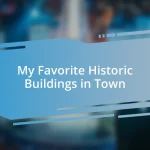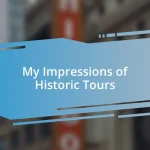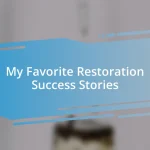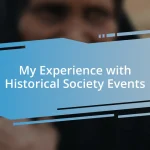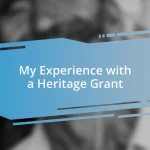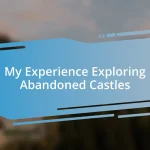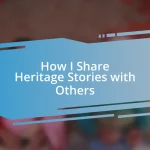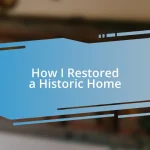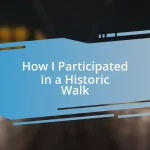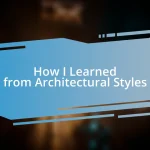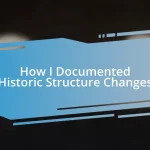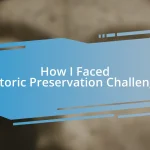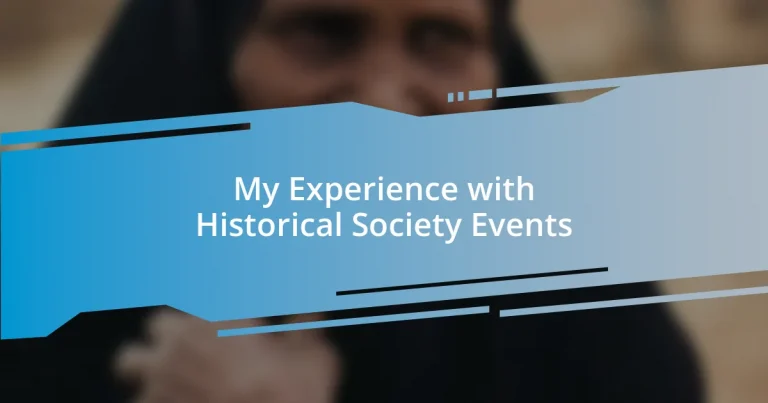Key takeaways:
- Historical society events foster community connections and deepen understanding of local narratives, transforming history from mere facts into relatable, lived experiences.
- Participating in diverse activities like heritage festivals, lectures, and reenactments enhances personal growth and allows for immersive learning about cultural traditions.
- Networking opportunities at these events can lead to meaningful collaborations and friendships, enriching individual perspectives on history through shared passions.
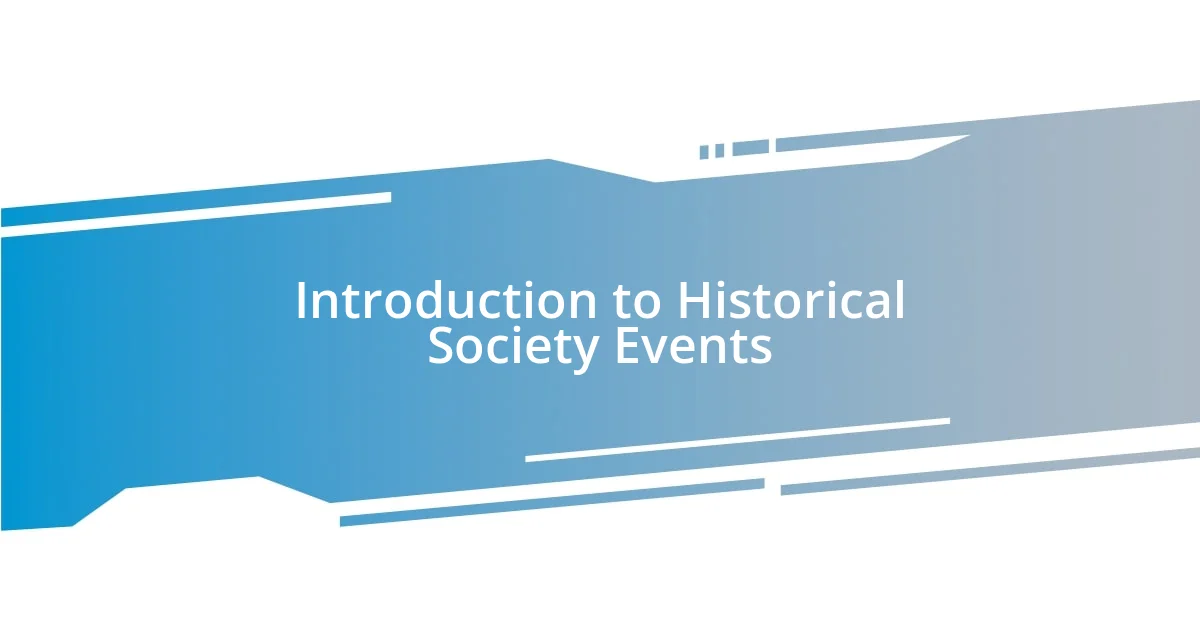
Introduction to Historical Society Events
Historical society events are more than just gatherings; they serve as a bridge connecting us to our past. I still remember the thrill I felt attending my first local history fair, where passionate storytellers came together to share tales that breathed life into the dusty pages of history. It made me wonder: how often do we take the time to appreciate the rich stories woven into our communities?
These events often shed light on the lesser-known narratives that shape our society. At one event, I had the chance to engage with a descendant of a local civil rights leader. Hearing her share personal family memories was profoundly moving; it struck me that history isn’t just dates and events—it’s lived experiences. Isn’t it fascinating how a personal touch can turn a historical fact into something relatable and deeply human?
Moreover, historical society events create a space for dialogue and diverse perspectives. During a panel discussion I attended, participants debated the implications of local history on contemporary issues. It was enlightening to witness how these conversations can spark new ideas and encourage community involvement. How often do we seek out these opportunities to learn and grow together as a society?
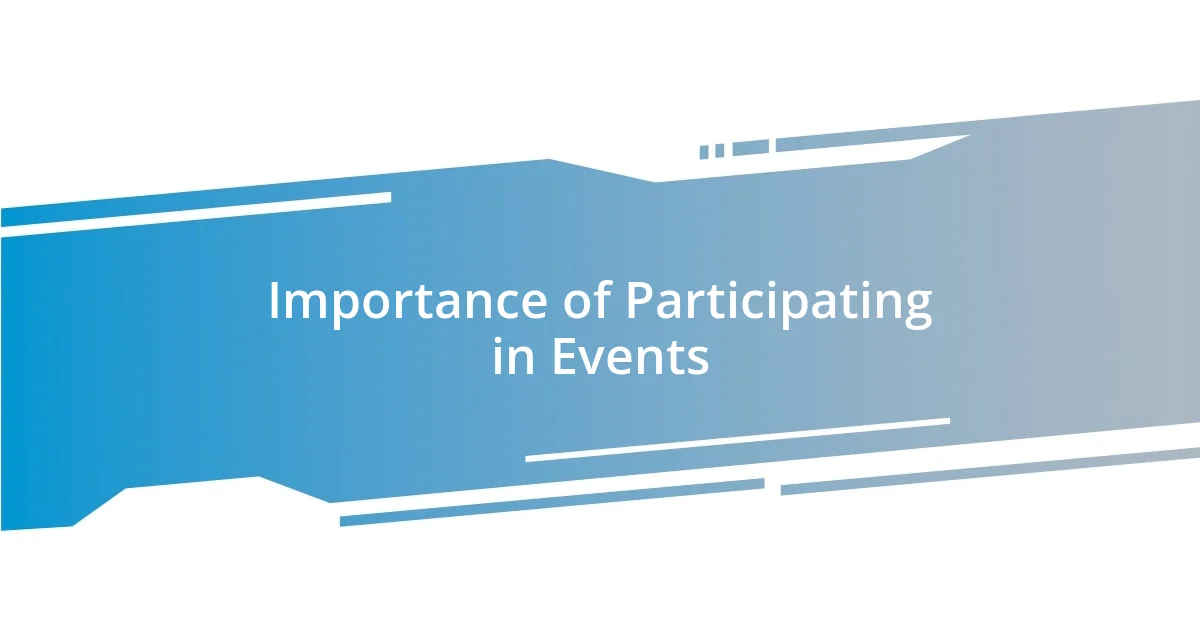
Importance of Participating in Events
Participating in historical society events is crucial for fostering a sense of community and identity. I remember attending a workshop on local heritage crafts; the warmth of the shared experiences turned strangers into friends. Engaging with others who share a passion for history creates a supportive environment where we can learn from each other. It reminds us how interconnected our stories are, weaving a vibrant fabric of collective memory.
- Deepens understanding of local history.
- Strengthens community bonds.
- Encourages the sharing of diverse perspectives.
- Offers opportunities for personal growth and learning.
- Helps preserve cultural traditions and stories.
When I took part in a reenactment event, it felt like stepping into a living history lesson. The excitement of donning period attire and interacting with others in character allowed me to appreciate the challenges and triumphs of those who came before us. Those moments of immersion not only made history palpable but also ignited a passion within me to share these experiences with others. Embracing these events allows us to honor our past while actively shaping our future.
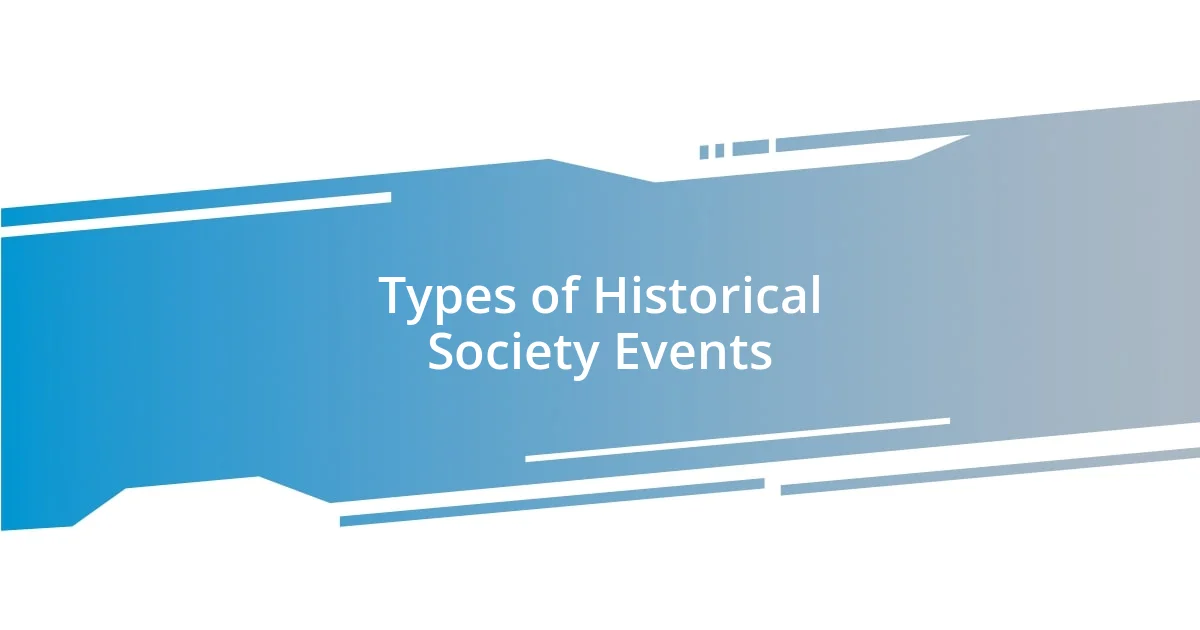
Types of Historical Society Events
Attending different types of historical society events has varied yet enriching experiences for me. For instance, I recall a heritage festival where local artisans showcased traditional crafts. It was mesmerizing to watch skilled craftspeople breathe life into centuries-old techniques, and I found myself captivated by their stories, which added depth to the artistic creations before me. It struck me how interests in crafts and history intertwined, revealing more about our cultural identity.
Another memorable type of event is the historical lecture series. I still remember one night where a historian discussed the impact of immigration on our town’s growth. As I listened, it felt as if the past was being woven into the very fabric of our reality. Sharing these stories deepened my appreciation for the sacrifices and resilience of those who came before us. These lectures often ignite a flame of curiosity, inspiring attendees to delve deeper into their local history.
Lastly, reenactments stand out as a unique way to engage with history. During one such event, I participated in a Civil War reenactment, which gave me a profound insight into the challenges faced by soldiers. As I stood in line with fellow reenactors, I could almost feel the weight of history upon us. It was more than just an act; it was a moment where I truly connected with the past, enriching my understanding of the human experience entwined within historical events.
| Type of Event | Description |
|---|---|
| Heritage Festivals | Showcases traditional crafts and community history through local artisans. |
| Historical Lectures | In-depth talks by historians that illuminate local narratives and connections. |
| Reenactments | Interactive performances where participants recreate historical events to convey lived experiences. |
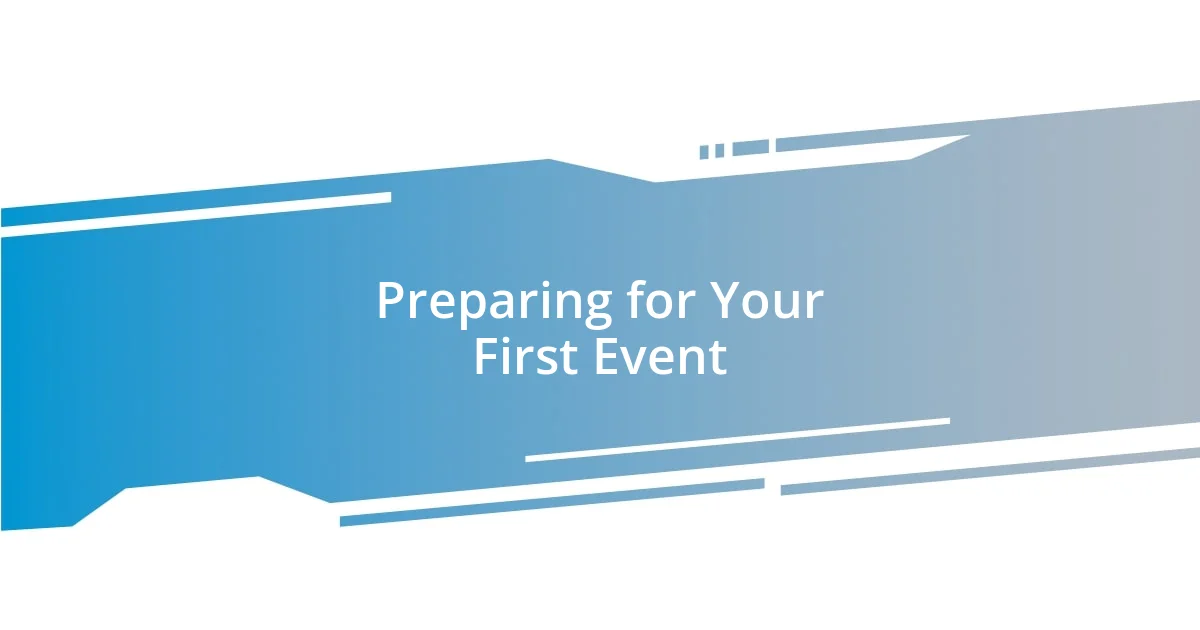
Preparing for Your First Event
One of the most exciting aspects of preparing for your first historical society event is the anticipation leading up to it. I remember the nervous energy I felt days before my first heritage festival. Asking myself questions like, “What should I wear?” or “Will I know anyone there?” was part of the process. I soon realized that all those thoughts were common and just a sign of enthusiasm.
When it comes to preparation, a little research goes a long way. Before my first reenactment, I spent hours reading about the era and understanding the context of the events. This not only helped me connect with others at the event but also enriched my experience as I interacted in character. It’s incredible how knowledge can transform a mere participation into a deeply immersive experience.
Don’t forget to pack a few essentials! I learned the hard way to bring water and snacks after a long day at a local history fair. Walking among booths and chatting with artisans can be exhilarating, but it can also be draining. Bringing some comforts can help you fully enjoy the day without feeling overwhelmed. It’s all about creating an experience that stays with you long after the event ends.
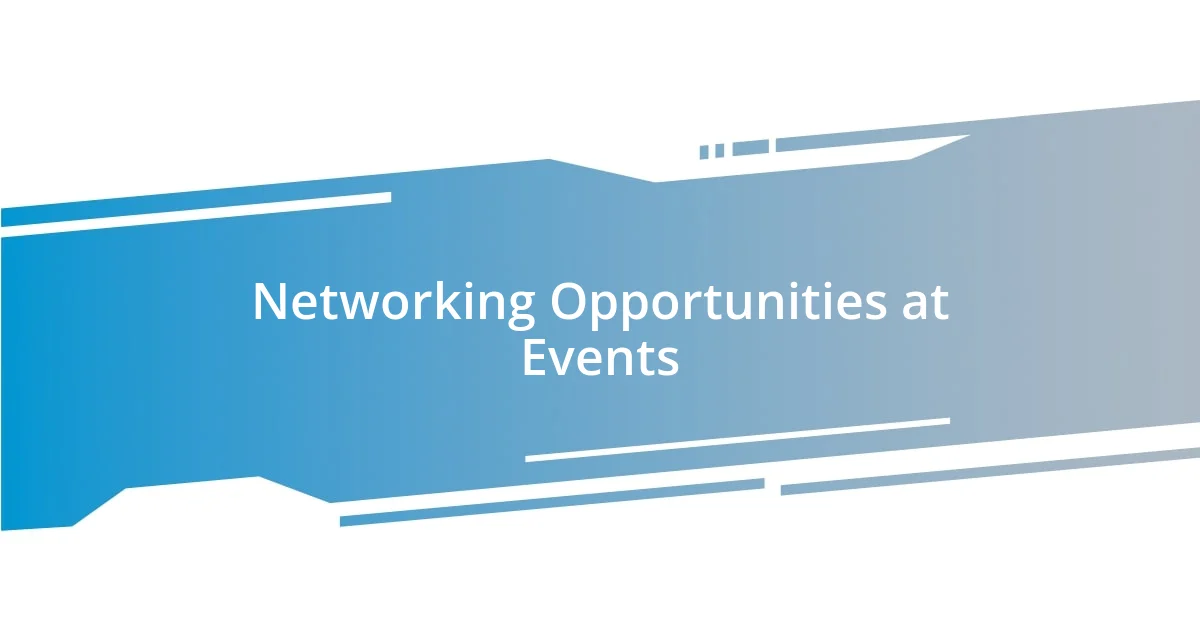
Networking Opportunities at Events
Networking at historical society events can be a game changer, and I’ve discovered this firsthand. I remember meeting a fellow history enthusiast at a small lecture series. We bonded over our shared fascination with local artifacts, and that simple conversation led to collaborative research on our town’s rich industrial history. Isn’t it fascinating how a single discussion can morph into a joint project that breathes new life into forgotten stories?
Finding meaningful connections while mingling with other attendees often feels organic. At one particular heritage festival, I struck up a chat with an artisan who specialized in traditional weaving. As we shared our perspectives on the importance of preserving crafts, it struck me how networking is about more than exchanging business cards—it’s about creating authentic ties based on mutual interests and passions. Have you ever thought about how these connections can enhance your understanding of history?
The spontaneity of these events amplifies networking opportunities in unexpected ways. I recall an impromptu discussion during a Civil War reenactment where I engaged with spectators and fellow reenactors. Sharing experiences and insights with individuals from different backgrounds fostered a collective appreciation for history. This kind of networking isn’t just about gathering contacts; it’s about cultivating community, which can be an enriching experience for everyone involved.
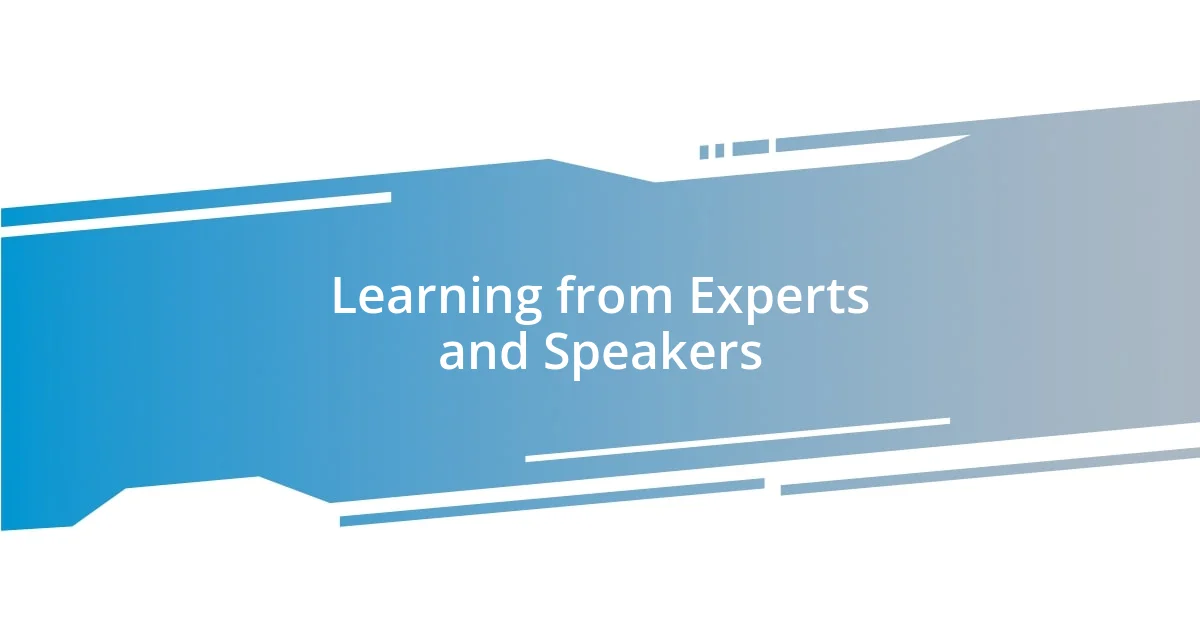
Learning from Experts and Speakers
Learning from experts and speakers at historical society events has always been a remarkable aspect of my experiences. I remember sitting attentively at a lecture where a renowned historian unveiled lesser-known perspectives about World War II. His passion radiated through every word, and it made me rethink my previous understanding. Have you ever felt that rush when a new angle shifts your entire perspective? It’s invigorating.
The interactive Q&A sessions that often follow these talks are like gold mines for knowledge. I once asked a question that opened up an unexpected discussion about the social dynamics of early American colonies. Hearing from not just the expert but also from fellow attendees enriched my understanding immensely. I truly appreciated how these sessions create a space where diverse thoughts converge, allowing us all to learn from one another.
I’ve even had the chance to participate in workshops led by speakers who specialize in hands-on history. At one event, I learned traditional storytelling as a method of historical preservation, and it struck a chord with me. It’s amazing how connecting with experts can inspire a deeper appreciation for history and prompt us to think creatively about how we share these narratives. How has connecting with knowledgeable speakers influenced your own journey in understanding history?
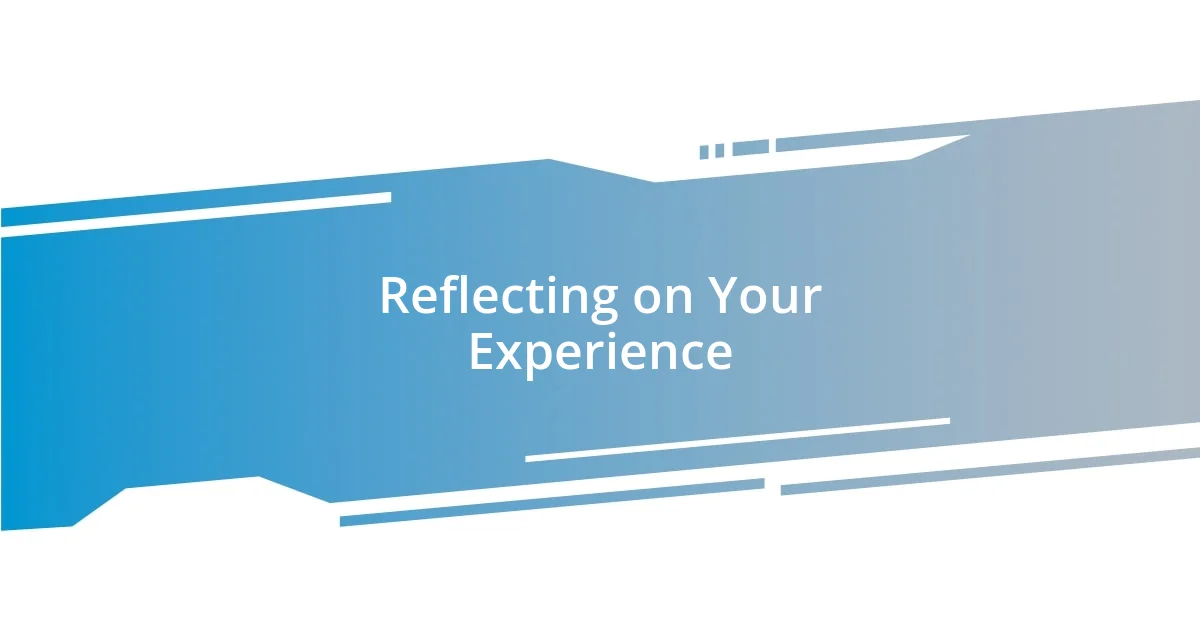
Reflecting on Your Experience
Reflecting on experiences at historical society events often brings me back to those moments that linger long after they’ve ended. I distinctly remember sitting on the grass during a reenactment, watching participants embody another time. The energy was palpable; witnessing history come to life filled me with a deep sense of connection to the past. Have you ever felt transported by a moment like that? It’s like stepping into a time machine, and I think it deepens my appreciation for our shared heritage.
One of my favorite reflections centers on the post-event discussions that I’ve enjoyed with fellow participants. Following a lively forum on women’s roles in shaping local history, I found myself engrossed in conversation with a newcomer who had unique insights. Sharing our thoughts and hearing her personal stories not only enriched my understanding but also created a lasting friendship. It reminds me how valuable these exchanges can be—what treasures might you discover in your own conversations?
Sometimes, when I look back at these gatherings, I realize they’re not just memories but catalysts for change in how I view my community’s history. After attending a museum opening, I went home and rallied a few friends to explore local sites we’d never considered. The thrill of uncovering hidden gems together was exhilarating. Reflecting on these experiences, I can’t help but wonder—how many opportunities to explore have we overlooked in our busy lives? Each event is a chance to reignite that curiosity, and that’s something worth cherishing.
